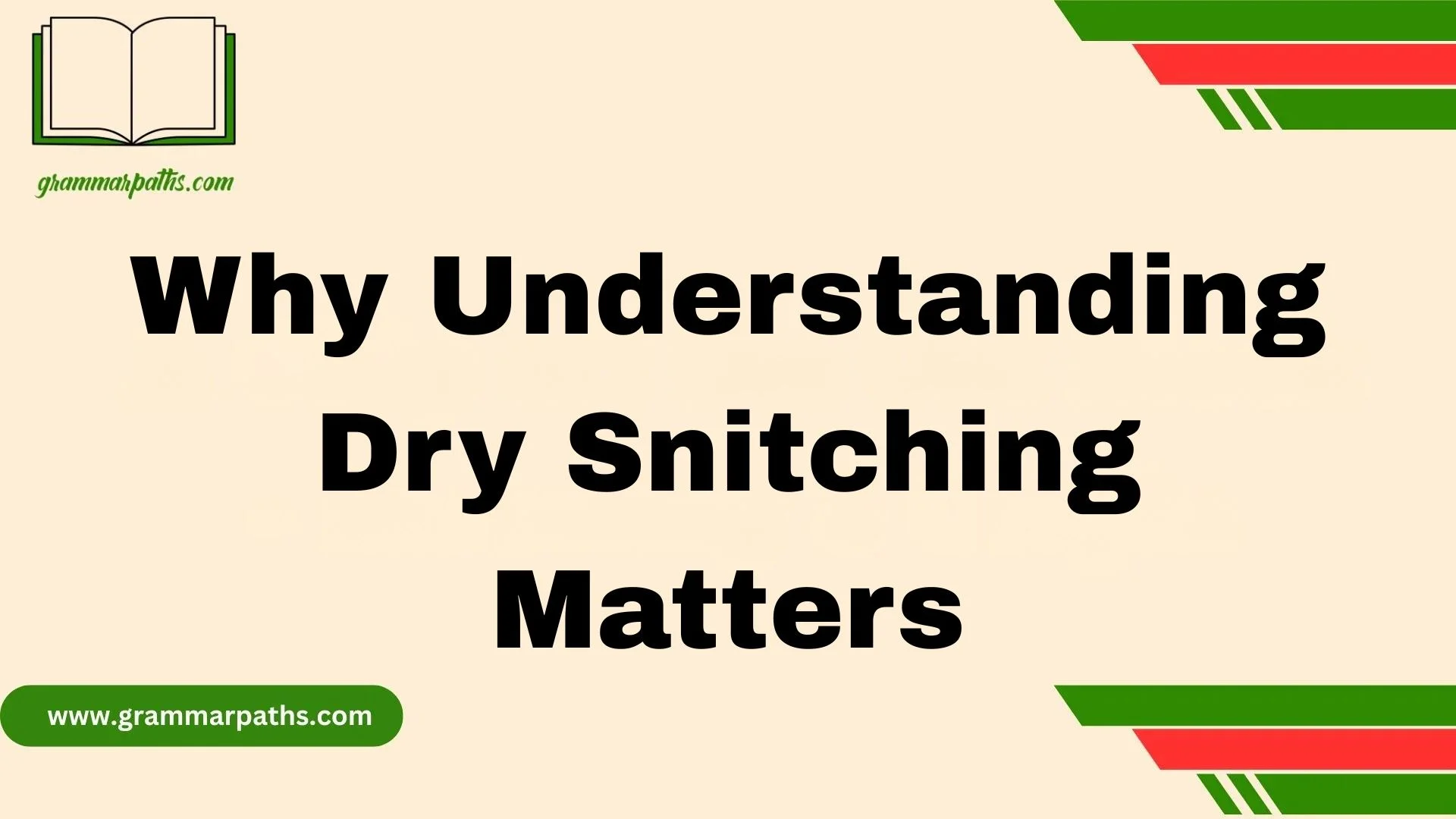You’ve probably seen the phrase dry snitching floating around in TV shows, tweets, or even during casual talks with friends. It might seem like just another slang term that’ll fade into obscurity next month, but don’t let its low-key vibe fool you. This slang has roots deep in real social behavior and carries heavy implications. I once heard a conversation where someone was just throwing a “harmless” remark about a co-worker, yet it left that person with a slap to the face—all without an outright telling. That’s the dry art of snitching, done indirectly, often slinking around the edges of our daily interactions.
In these situations, it’s not what’s being said—it’s what’s being implied. It’s someone dropping hints, talking about a situation just enough for others to figure out what happened. The person doing it often seems innocent, but that’s part of the trick. They’re giving away secrets or private information without directly saying a word. This subtle telling becomes even more dangerous with the rise of online communication. A comment in a group chat or scrolling through group DMs may not look like much, but it spreads faster than fire. It’s how communication gets messy and trust gets broken, all under the usage of what looks like a casual slang phrase.
It’s important to understand what dry snitching entails. In 2025, things like secrecy, implication, and indirect disclosure can do more harm than an actual accusation. From the workplace, where one comment can stir up a team, to memes and TV where such behavior is joked about but mirrors reality—it’s everywhere. Whether it’s a tweet, a remark at lunch, or scrolling through comment sections, the effects are real. I’ve had to navigate these spaces, learning to spot a subtle snitch, and knowing when to step away from the fray. That awareness? It can protect your standing, preserve your clarity, and save months of trying to mend tense relationships.
What Does ‘Dry Snitching’ Really Mean?
At its core, dry snitching means revealing someone’s secret or wrongdoing without openly accusing them. Unlike traditional snitching, which is clear and direct, dry snitching is more like dropping hints or “accidentally” sharing information.
For example, imagine a student telling a teacher, “I saw someone at school who probably shouldn’t have been there.” They don’t name names but basically tip the teacher off. That’s dry snitching in action.
Key characteristics:
- Indirect revealing of info
- Avoids outright accusations
- Often uses vague or coded language
People use phrases like “not saying names, but…” or “someone told me that…” to keep it subtle. It’s the difference between yelling “He did it!” and whispering “I heard something about him.”
Origins of Dry Snitching in American Slang
The term dry snitching grew from street and hip-hop culture, especially in the US. It emerged in the early 2000s, becoming popular through rap lyrics and urban slang.
Hip-hop artists often discuss loyalty, trust, and betrayal — dry snitching fits right into those themes. It reflects a social code where you don’t openly snitch, but still somehow reveal information.
Over time, dry snitching entered everyday conversations, especially among teens and young adults, spreading through social media, music, and TV.
Dry Snitching vs. Snitching: What’s the Real Difference?
People often confuse dry snitching with regular snitching. Here’s how they differ:
| Feature | Snitching | Dry Snitching |
| Directness | Clear, explicit accusation | Indirect, subtle hinting |
| Intent | Often to get someone in trouble | Can be accidental or passive |
| Social perception | Usually negative | Seen as sneaky or passive-aggressive |
| Communication style | “He did X” | “Someone around here did something” |
Traditional snitching is straightforward — you tell authorities or someone else exactly what happened. Dry snitching, by contrast, leaves it open for interpretation.
How Dry Snitching Works in Real Life
Dry snitching often flies under the radar. It can happen through body language, social media, or vague comments.
Here are common ways people dry snitch:
- Hinting: “I know who broke that window…” without naming anyone.
- Non-verbal cues: Rolling eyes or smirking when someone is talked about.
- Social media: Liking or commenting on a post about someone’s misstep without directly addressing it.
- Sharing “news” with friends but avoiding clear details.
This indirect style makes it hard to prove or confront but can cause serious damage to relationships.
Common Situations Where Dry Snitching Happens
Dry snitching pops up in all kinds of places. Here are some typical scenarios:
At School
- A student says, “Someone cheated on the test,” and teachers catch wind without a name.
- A friend drops hints about another friend’s bad behavior without calling them out.
Workplace
- Coworkers gossip about someone missing deadlines but never say who.
- A boss hints at knowing about office drama but avoids details.
Social Settings
- At parties, people might quietly “warn” others about someone’s past actions without naming names.
Online Communities
- On platforms like TikTok or Reddit, people post vague stories or memes targeting others indirectly.
Is Dry Snitching Always Bad? Ethics and Intentions
Not every case of dry snitching comes from a bad place. Sometimes people reveal info to protect others or prevent harm.
When dry snitching might be justifiable:
- Alerting someone to danger without exposing identities.
- Warning friends about a dishonest person without public shaming.
- Protecting privacy while still informing.
Ethical gray areas include:
- When does indirect revealing cross the line into betrayal?
- How does intent affect the morality of dry snitching?
- Can it be a form of passive-aggression or manipulation?
Understanding these shades of meaning helps you navigate tricky social waters.
Dry Snitching in Pop Culture, Music, and Media
Popular culture often reflects how slang evolves. Dry snitching appears in:
- Hip-hop and rap: Artists like Meek Mill and Jay-Z discuss snitching culture, highlighting loyalty.
- TV shows: Series like The Wire or Power showcase dry snitching in street dynamics.
- Social media: Memes joking about “accidentally” snitching without meaning to.
These references help spread the phrase but also shape how people think about loyalty and trust.
How to Handle Dry Snitching If It Happens to You
Finding out someone dry snitched about you can sting. But how should you react?
Practical tips:
- Stay calm. Reacting angrily often makes things worse.
- Clarify what was said. Ask questions to understand exactly what info leaked.
- Set boundaries. Let people know you expect honesty but respect.
- Choose your circle wisely. Keep trusted friends close.
- Respond with grace. Sometimes ignoring is the best response.
In workplaces or schools, report repeated issues through proper channels but avoid gossip.
Preventing Accidental Dry Snitching
Sometimes, people dry snitch without meaning to. To avoid this:
- Think before sharing info, especially about others.
- Avoid vague or hinting language that reveals too much.
- Respect privacy even in casual conversations.
- Be mindful of social media posts and likes.
Teaching teens and adults these habits can prevent misunderstandings.
The Evolving Use of Dry Snitching in Modern Language
Language changes fast, especially among younger generations.
- Dry snitching now includes online behavior like subtweeting or meme-sharing.
- Younger people sometimes use the phrase jokingly or ironically.
- It’s become part of broader conversations about loyalty, privacy, and social dynamics.
Memes and viral videos keep the slang alive and changing.
Conclusion
Understanding dry snitching isn’t just about knowing a slang term—it’s about recognizing how communication, hints, and implied telling can quietly damage trust. Whether it’s in a workplace, during casual talks with friends, or hidden in a tweet, these subtle reveals have real consequences. As someone who has had to navigate tense situations caused by a single offhand comment, I know firsthand how quickly relationships can spiral when someone is indirectly telling private information. By staying aware, preserving your clarity, and knowing when to step away, you protect yourself and others from unnecessary drama.
FAQs
What does “dry snitching” mean?
Dry snitching means someone is indirectly telling on someone else, usually in a way that doesn’t seem obvious. It involves dropping hints, giving away secrets, or making comments that let others figure out information they shouldn’t know—without outright telling.
Why is dry snitching considered harmful?
It’s harmful because it breaks trust, damages relationships, and often leaves the person doing it looking innocent. In digital spaces like social media, group DMs, or comment sections, it can spread faster than direct accusations.
How can you spot dry snitching?
Look for subtle telling or implied disclosure in a conversation, tweet, or remark that hints at private information. Often, it feels like gossip, but the implications can be serious, leading to fractured team spirit and betrayal.
How do you handle it if someone is dry snitching about you?
Stay calm, understand the situation, and decide whether to respond or step away from the fray. Sometimes, preserving your clarity and avoiding a public confrontation helps maintain your reputation and prevents a spiral of conflict.
Quick Recap Table: Dry Snitching Essentials
| Topic | Key Point |
| Definition | Indirectly revealing info without naming names |
| Origin | Hip-hop and street slang, early 2000s |
| Real-Life Examples | Vague comments, social media hints |
| Ethical Debate | Sometimes protective, sometimes betraying |
| Pop Culture References | Music, TV shows, memes |
| Handling Tips | Stay calm, clarify, set boundaries |
| Prevention | Think before sharing, respect privacy |

Grace Marie is the dedicated writer behind GrammarPaths.com, where she shares her passion for English grammar, idioms, and writing mastery. With a strong background in language studies and years of experience helping learners improve their communication skills, Grace creates clear, practical, and engaging content that makes English easy to understand.












